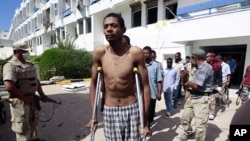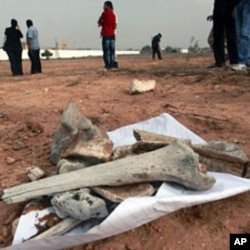Libya's new leaders are forming a transitional government as they consolidate control and battle the remaining forces loyal to deposed leader Moammar Gadhafi. They face numerous challenges - perhaps one of the greatest being in the area of human rights.
Libyans are still savoring freedom and today a popular outing is to visit the sprawling palace grounds of ousted leader Moammar Gadhafi.
Children pose for pictures among the ruins of the deposed colonel's palace and former rebels fire their guns in celebration.
Libyans are also uncovering the excesses of Mr. Gadhafi's 42-year rule. Human rights activists say the society has yet to address severe human rights abuses during the Gadhafi era as well as during the struggle to remove him.
Abu Salim Prison is a vast walled complex where thousands of political prisoners were held over the years and where many of them died or disappeared. When rebels took over the prison in late August, they found extensive files about political prisoners, dissidents and many ordinary citizens.
Mohamed Salem Drah is one of several human rights lawyers documenting detentions, disappearances and other violations by the Gadhafi regime.
"It is very important for history. It is very important for those who were injured. It is very important for justice itself," said Drah.
Doctors and nurses in his group are also documenting cases of abuse of prisoners and civilians during the months of fighting. They say both sides committed abuses, although they say, Gadhafi loyalists were responsible for most of them.
The head of the National Transitional Council, Mustafa Abdel Jalil, is urging Libyans to refrain from acts of revenge and is calling on Libyans to build a state that respects the rule of law.
Jalil says the nation must work to abolish hatred and jealousy, and he urges Libyans to avoid revenge and oppression. He says reports of abuses will be investigated.
Human rights organizations are especially concerned about the plight of Libya's sub-Saharan Africans who numbered more than one million and made up one-sixth of the country's population. Some of them reportedly fought with forces loyal to Moammar Gadhafi.
Rights workers say more than one-third of all prisoners are black Africans. Some of them have told reporters that they were offered money or citizenship to fight for Mr. Gadhafi.
But most were migrant workers. Many fled Libya when the fighting began. But more than 100,000 remained and gathered in makeshift camps for protection.
Peter Bouckaert of Human Rights Watch says many were suspected of being pro-Gadhafi fighters and often were detained without reason or charge.
"The problem is that once they get detained by these overzealous young armed men on the streets, they get taken to a detention facility and there is really no process in place to get them released. There is no investigative authority, no judicial authority in place right now," Bouckaert said.
Bouckaert says it will be difficult to transform the police state built by Moammar Gadhafi into a modern democratic society. But, he says, this is what most Libyans want.
“We know there will be vast challenges to rebuild structures of a state, but there really is a genuine commitment there - not just on the part of the new leadership, but also on the part of the population. It lived under brutality for so long that they know it is not what want,” said Bouckaert.
He says it is important that supporters of Mr. Gadhafi who did not engage in human rights violations be included in the healing and rebuilding process. Because, he says, if they join, the transition can be achieved relatively smoothly and without retribution.





